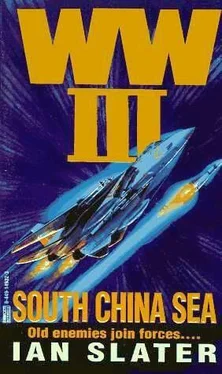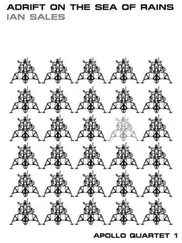The rock was Louisa Reef, known in Chinese as Nantong Jiao. It was all of three feet above the sea. He felt the raft being taken away by the current, and once more paddled hard, until he thought his arms would break. He remembered, as if it was a dream, reading in “The Story of San Michele” by Dr. Alex Munthe, how Guy de Maupassant pressed Munthe to tell him what was the most terrible form of death at sea, and Munthe had replied — to be at sea with a life belt to keep you alive during the hell of dehydration. The next morning de Maupassant threw all his life belts overboard.
His hands bleeding from the coral and barnacles clinging to the rock, Mellin hauled himself and his small, broken plank raft up on the reef and hoped it was already high tide. Exhausted, he could do nothing but pray that by morning someone would find him.
It began to rain. He lay on his back, his legs dangling over the edge of the rock, opening his mouth to let the rainwater revive him. He looked around for the fin, suddenly lifting his foot as he did so, but now he could see nothing but the turbulent gray sea all about him.
The President of the United States began his address to the nation about the situation in the South China Sea by calling for a meeting of the U.N. Security Council at four p.m. He pointed out that regardless of claims over ownership of ocean resources, the United States of America would tolerate neither attacks against Americans nor any closure of or other interference with the vital sea lanes through which Mideast oil traveled to the United States and Japan. And for this reason he had ordered the U.S. Seventh Fleet into the South China Sea.
The violence of the long dispute, he pointed out, had spilled over into border clashes before the current invasion of Vietnam by China. China must recover her troops, he said. Failure to do this within seventy-six hours would leave the United States no alternative but to support the position of the People’s Republic of Vietnam, which had once again, without warning — and here he referred to the 1979 and 1982 Chinese incursions — been invaded by its neighbor to the north.
“It is not only in our own economic interest to take this action,” the President added, “but in the interest of world peace.” It was time to extinguish the spark before, “fanned by the winds of old hatreds and intolerance,” it ended up with a brushfire which could engulf all of Southeast and Northeast Asia. By Northeast Asia he meant a possible clash between North Korea, South Korea, Japan, and China, and the Japanese-Russian dispute over the Northern Territories islands.
After the speech, taking off his throat mike, he confided to his wife, “I liked that bit about ‘the winds of—’ “
“Excuse me, Mr. President…”
“Yes?”
It was an aide, very tense, armed with a fax just in from the National Security Agency. NSA had SIGINT — Signal Intelligence — of transmissions along the Kampuchean border that showed incursions by Khmer Rouge Communists on Vietnam’s western flank. The President handed the fax to Ellman.
“Bastards!” Ellman said, then apologized in front of the First Lady, adding, “Beijing is obviously behind this. They’ve supported the Khmer Rouge for years.”
“Whether or not Beijing’s behind them,” the President commented, “an air strike or two over the area should cause them to think again. The Khmer Rouge…” He paused. “You know, Ellman, if someone has to test the mettle of our foreign policy, it might as well be the Khmer Rouge. They’re as bad as the Nazis. The genocide they’ve committed is unspeakable. I’ve ‘never forgotten those shots of the pyramids of skulls they made… and to start the world over, dating their calendar the year One. They’re psychopaths. Suck up to the Chinese because of Beijing’s support. Beijing sees it as an extra army on the Vietnamese flank. I can’t think of a better target than the Khmer Rouge. And remember what the Khmer Rouge and Vietnamese fought about after the Vietnam War with us.”
“What? Islands?”
“Islands in the Gulf of Thailand. I tell you, these damned offshore islands have caused no end of trouble.”
“It would have to be a carrier strike, Mr. President-against the Khmer Rouge.”
“Why not B-52s?”
“Too big, given our lack of runways, and because of our allies, like Japan, who fear upsetting the Chinese. No one’ll give us landing or refueling rights in Southeast Asia. They’re all scared stiff of the Chinese, not only in China proper, but within their own populations. Singapore has seventy-six percent Chinese. Brunei is too small to take the heat. Malaysia has thirty percent Chinese. Indonesia won’t help us. So without airfields, we’d have to use shorter-range fighter-bombers off a carrier.”
“How about the airstrips at Okinawa?”
“No. Essentially it’d be the same as launching from the Japanese mainland. Tokyo won’t give us the go-ahead. They’re probably right, strategically speaking. Beijing would go ape, and like North Korea, Beijing can scud Japan.” Ellman paused. “I suppose we could launch Tomahawk cruise missiles from one of our subs.”
“Yes,” the President responded, “but I’d favor the carrier aircraft option over that. And I don’t mean an attack by stealth, I’d want this on CNN. If we’re going to stop a full-scale war started by the Khmer Rouge or China before it gets out of hand, I want the world to see American foreign policy straight and simple in action. No hide-and-seek on this one, and like I said, if it comes to kicking ass, I can’t think of a better target than those Khmer sons of bitches.”
“If air strikes don’t do it?” Admiral Reese asked.
Ellman interjected. “We could alert Second Army’s Emergency Response Force at Fort Bragg, Mr. President. Do you want me to write up the—”
“Christ, no!” the President cut in. “For God’s sake don’t anyone notify that—” The name escaped the President for the moment.
“Douglas Freeman,” Ellman put in. “He’s a good man, sir. In my opinion our best for—”
“I agree,” the Present said. “But damn it, if he gets the bit between his teeth before we’re ready to move, it could be a media relations disaster. Haven’t met the man, but State tells me you put a microphone anywhere near him, it explodes into controversy. I don’t doubt he’s one of the most brilliant commanders we have — possibly the most brilliant — but they say he’s another Patton. Can’t keep his mouth shut.”
“Yes,” Reese said. “He even looks like George C. Scott.”
“Anyway,” the President continued, “we want to try to contain this with naval and naval air action alone.”
* * *
At the urging of the United States, the U.N. Secretary General called the special meeting of the Security Council. Problem was, as Ellman reminded everyone, the Chinese, like the other four permanent members — Britain, the U.S., the Russian-led Commonwealth of Independent States, and France — had the power of veto over any Security Council resolution.
“We didn’t have it in the case of Korea,” Ellman pointed out.
“Then how did you manage to get a U.S.-led U.N. force in there?” Ellman’s aide asked. The aide, Ellman realized, would not have been born when the Korean War of the early fifties broke out.
“Well,” Ellman explained, “the Soviet representative at the time had stormed out in protest over the failure of the U.N. to grant Communist China a seat and left town in a huff. So when North Korea invaded the South and the emergency meeting of the Security Council was called, the Soviet rep was unable to make the meeting and the remainder of the Security Council voted unanimously to send in a U.S.-led police action. That’s how we got to get our troops in to throw back the Communists.”
Читать дальше












